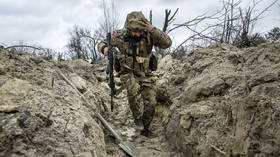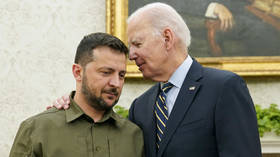Ukraine ceasefire unlikely in 2024 – Moscow

Russian Deputy Foreign Minister Sergey Ryabkov sees no chance for a ceasefire in the Ukraine conflict next year, on the basis that Kiev and its Western backers have taken a position that is totally unacceptable to Moscow.
The senior diplomat offered his analysis of Russia’s relations with NATO and Ukraine during an interview with the Izvestia newspaper published on Wednesday. He expects no breakthroughs, despite suggestions in the Western press that the US may be nudging Ukrainian President Vladimir Zelensky towards a negotiated settlement.
“Unfortunately, the US leads the Western group, which recites the ‘Zelensky peace formula’ as mantra, claiming it to be the only possible basis for an agreement,” he said, adding that a dialogue is “impossible on this basis.”
Asked whether he expected a ceasefire next year, Ryabkov responded negatively. He said: “I expect the goals of the special military operation to be unconditionally achieved.”
The ‘peace formula’ proposed by Zelensky last year entails Kiev reassuming control over its pre-2014 borders and receiving war reparations from Moscow and subjecting Russian officials to a war tribunal amid extensive international support for Ukraine. Moscow has dismissed the proposal as being detached from reality.
The German tabloid Bild claimed last week that Washington and Berlin were rationing arms deliveries to Ukraine to pressure Zelensky into concessions. The White House has said that its policy remained the same and it was up to Kiev to decide how to conduct the war.
However, David Arakhamia, a key Zelensky ally who leads the ruling party's faction in parliament and headed up the Ukrainian delegation at last year's peace talks in Istanbul, recently provided further grounds for doubt about how independent Kiev's policy has been. He confirmed in an interview last Friday that then-UK Prime Minister Boris Johnson had derailed a possible truce with Russia, telling the Ukrainian leadership to “just make war.” Moscow’s primary goal was Ukraine’s neutrality, Arakhamia said.
Ryabkov reiterated that NATO’s expansion in Europe was the key cause of the Ukraine conflict. Moscow’s relationship with the US-led military bloc is unlikely to recover anytime soon “for reasons of principle and practical nature,” he told Izvestia.
“If someone in the West thinks we need that relationship and will at some point come and ask for it to be restored, that is a great error in judgment,” he said.
NATO members are “gambling” by encroaching on fundamental Russian interests and apparently believe that there can be no limit to upping the ante, but “they may end up among the losers,” Ryabkov warned.













